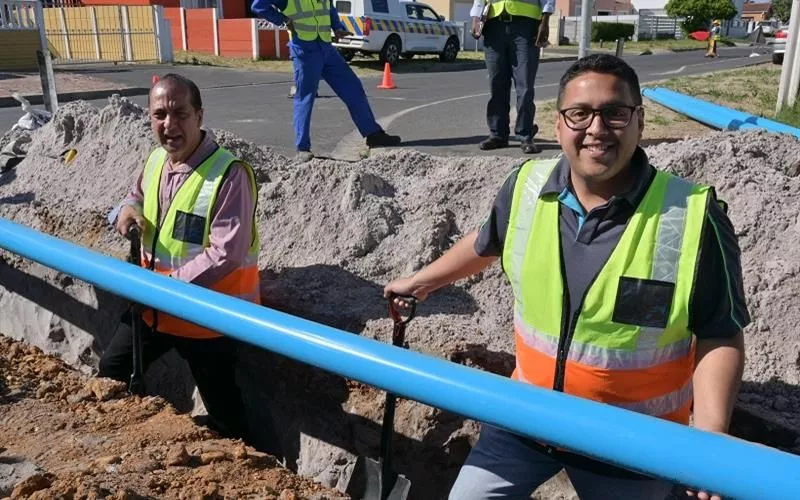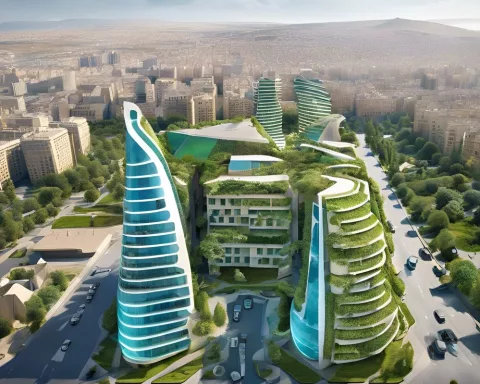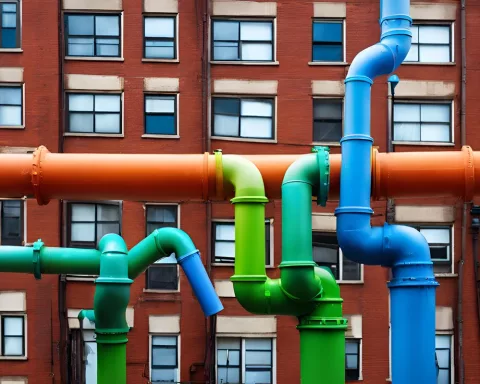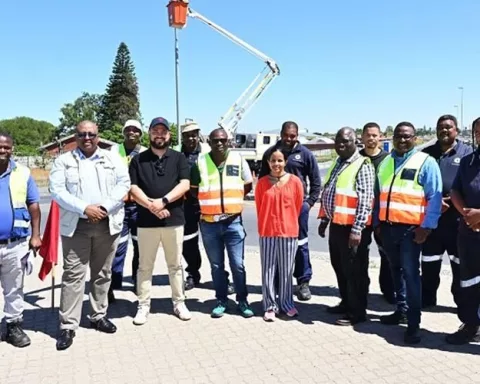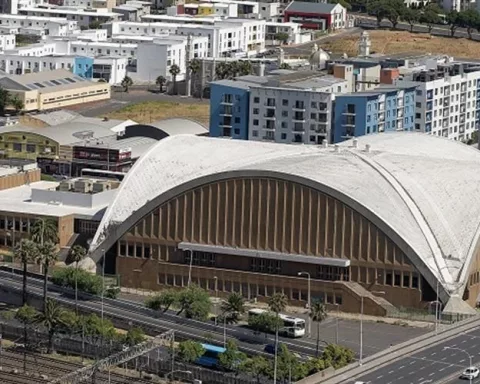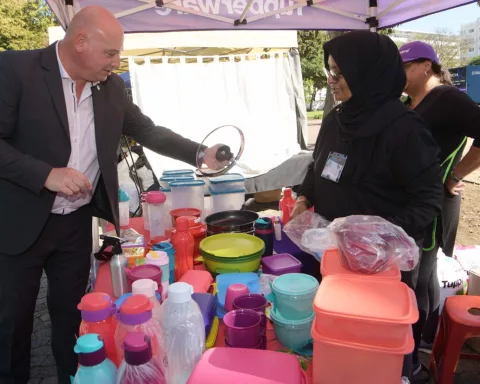Athlone is revamping its water infrastructure by replacing outdated water mains with new uPVC pipes as part of its yearly pipe replacement program. The project aims to provide a reliable water supply in the long term and has allocated a significant amount of funds for water and sewer pipe replacement programs. Upgrades to the pipes in the Bridgetown suburb involve replacing outdated, fibre cement water mains with new 110mm diameter pipes that conform to compliance standards set by the South African Bureau of Standards. The initiative showcases the city’s commitment to sustainable development and the well-being of its citizens.
What is Athlone’s water infrastructure project?
Athlone’s city administration is replacing its outdated, fibre cement water mains with new 110mm diameter uPVC pipes as part of its Water and Sanitation Directorate’s yearly pipe replacement program. This initiative aims to tackle the deteriorating water infrastructure and provide a reliable water supply for residents in the long term. The city has allocated a staggering R863.6 million during the 2023/24 fiscal year for water and sewer pipe replacement programs.
Upgrading Aged Water Mains
In a bid to ameliorate the water supply and tackle aging infrastructure, Athlone’s city administration has embarked on an extensive project to replace its old water mains. As part of the City’s Water and Sanitation Directorate’s yearly pipe replacement programme, an impressive 1,560 meters of outdated, fibre cement water mains are being replaced with cutting-edge pipes in the Bridgetown suburb.
This initiative follows the successful completion of the first phase, which involved replacing pipes along Antelope Court, Weaver Court, Robin Court, Snowdrop Square, and Sipres Road in April 2023. With a steadfast commitment to addressing the deteriorating water reticulation infrastructure, the city allocates funds for these replacements on a yearly basis.
One ongoing project in Bridgetown aims to revamp the underground system traversing Wilger Plein, Lark and Sunbird Courts, and Kalkoen Street. Initiated in September, this work is scheduled for completion by March 2024.
Adopting New Pipe Standards
The need to replace the water mains in this area was fueled by the realization that the existing 50mm diameter fibre cement pipes were relatively small and susceptible to frequent bursts. In their stead, new 110mm diameter uPVC pipes will be installed, providing a cost-effective solution with a prolonged lifespan. These upgraded pipes conform to the compliance standards approved by the South African Bureau of Standards (SABS).
Councillor Badroodien expressed contentment with the ongoing work, stating that it would guarantee a reliable water supply for residents in the long term. He also emphasized the potential for reduced disruptions and a decline in expensive repairs resulting from unforeseen pipe bursts.
Emphasizing its commitment to the water and sewer pipe replacement programme, the city has allocated a staggering R863.6 million during the 2023/24 fiscal year. This investment stretches across Cape Town, signifying an all-encompassing commitment to updating the region’s infrastructure.
Preparing for Future Growth
Councillor Badroodien asserts that the proactive replacement of pipe networks readies the city for rapid population expansion. This strategic planning enables systematic budgeting and rehabilitation of infrastructure, accounting for the anticipated wear and tear that occurs over time. Moreover, the pipe replacements play a vital role in minimizing leaks and conserving water—an indispensable aspect of sustainable city management.
This ambitious endeavor reflects a growing global trend of cities adopting a proactive approach to infrastructure management. By staying abreast of technological advancements, municipalities can decrease the frequency of expensive emergency repairs and ensure a more effective and reliable water supply for their residents. In Athlone’s case, this initiative exhibits a broader commitment to sustainable development and the well-being of its citizens.
Fostering Community Engagement
Throughout the modernization process, the city has recognized the importance of maintaining accessibility for its residents. By employing a sophisticated, yet easily understandable language, the project’s progress remains transparent and engaging for the general public. This accessibility reinforces the city’s dedication to fostering a sense of community and guarantees that all residents have a clear comprehension of the ongoing improvements.
As the project progresses, it offers a unique opportunity to assess the impact of such large-scale infrastructure enhancements on the community and the local economy. Athlone’s pipe replacement initiative serves as an excellent example of how forward-thinking city planning can establish a more resilient and sustainable urban environment.
In conclusion, the water infrastructure overhaul in Athlone symbolizes a significant stride forward in the city’s continuous efforts to modernize its water supply network. The substitution of aged water mains with state-of-the-art uPVC pipes not only heightens the efficiency and dependability of the water supply but also prepares the city for sustained growth. By acknowledging the historical importance of such projects and employing a clear and engaging communication strategy, the city of Athlone sets a shining example for other urban centers seeking to navigate the obstacles of modernization while maintaining strong connections with their residents.
1. What is Athlone’s water infrastructure project?
Athlone’s city administration is replacing its outdated, fibre cement water mains with new 110mm diameter uPVC pipes as part of its Water and Sanitation Directorate’s yearly pipe replacement program. This initiative aims to tackle the deteriorating water infrastructure and provide a reliable water supply for residents in the long term.
2. How much funds has Athlone allocated for its water and sewer pipe replacement programs?
The city has allocated a staggering R863.6 million during the 2023/24 fiscal year for water and sewer pipe replacement programs.
3. What is the main objective of the water infrastructure project in Athlone?
The main objective of the water infrastructure project in Athlone is to provide a reliable water supply in the long term.
4. What areas in Athlone are currently undergoing pipe replacement?
As of April 2023, pipes along Antelope Court, Weaver Court, Robin Court, Snowdrop Square, and Sipres Road were replaced. Additionally, work is ongoing in Bridgetown to revamp the underground system traversing Wilger Plein, Lark and Sunbird Courts, and Kalkoen Street.
5. Why are new 110mm diameter uPVC pipes being installed in Athlone?
New 110mm diameter uPVC pipes are being installed in Athlone because the existing 50mm diameter fibre cement pipes were relatively small and susceptible to frequent bursts. The new pipes provide a cost-effective solution with a prolonged lifespan.
6. What compliance standards do the upgraded pipes conform to?
The upgraded pipes conform to the compliance standards approved by the South African Bureau of Standards (SABS).
7. How does the water infrastructure project in Athlone prepare the city for future growth?
The proactive replacement of pipe networks readies the city for rapid population expansion by enabling systematic budgeting and rehabilitation of infrastructure, accounting for the anticipated wear and tear that occurs over time.
8. How does the city of Athlone foster community engagement during the infrastructure modernization process?
The city of Athlone maintains accessibility for its residents by employing a sophisticated, yet easily understandable language, ensuring that residents have a clear comprehension of the ongoing improvements. This accessibility reinforces the city’s dedication to fostering a sense of community.

